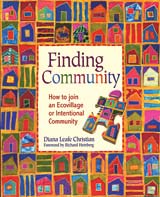There’s a certain smugness to the portraits of communal living in Diana Leafe Christian’s latest book, Finding Community: How to join an Ecovillage or Intentional Community (New Society Publishers, 2007). But, since Christian is the editor of Communities magazine and herself a resident of Black Mountain’s Earthaven Ecovillage, she’s well versed in the perks and bragging rights of commune life.

“I sip a cup of coffee (fair trade, of course) made from freshly ground beans from our local natural foods cooperative, and toast some delicious whole grain bread from a local bakery. My friend Rachel and I plan to meet at 7:30 for a short bike ride before our work days start.” This is a description of one woman’s life in Ithaca, N.Y.‘s EcoVillage, though to many Asheville residents it could read like a play-by-play of daily events.
Bike commuting? Fair-trade coffee? Check. With organic food, biodiesel and potluck dinners around every Asheville corner, why bother moving to an intentional community, anyway?
Well, to begin with, Christian is quick to point out the communities aren’t for everyone. Instead, the planned domiciles (which range from rural farms to urban apartments) are intended for people sharing common interests and goals, from group meals and commonly owned tools to environmental efforts such as carpooling, green building and living off the grid.
“The average person considering [moving to an intentional] community can be quite naive,” Christian notes. Her book maps out factors to take into account, such as the community’s location, set of values and proximity to one’s family, and whether it’s an income-sharing endeavor.
According to Finding Community, types of communities vary from ecovillages and cohousing groups, in which members are generally responsible for their own livelihoods, to spiritual and income-sharing communities, where members are bound by shared ideology and finances.
“People should match the community to their values rather than try to change to suit the community,” Christian explains. “Don’t try to fit a square peg into a round hole.”
In fact, according to the book, joining a community is a process that can take years, especially when buying or building property is involved.
“The cost of buying a home in cohousing can seem slightly higher than comparable market-rate housing for similar-sized housing units in the area,” the book reports. “Joining a cohousing community essentially means buying a house.”
For those with meager resources, income-sharing communities provide instant gratification. Because members live together in dormitory-style buildings, there’s no need to save up for a down payment or a mortgage. Income-sharing communities usually offer employment as well. Seed gathering, hammock weaving and nut-butter production are just a few options some long-term communities offer. Besides these product-based jobs, everything from laundry to recycling counts toward the hours community members need to work to earn their keep.
“In an income-sharing community you have the freedom not to work a job that closes your heart and deadens your soul,” is one opinion voiced in Christian’s book.
However, the author points out that group living isn’t all drum circles and tofu casserole. There are personality conflicts and money issues, among other problems, to contend with.
“I would say that the easier it is to join a community, the easier it is to leave,” Christian advises. High turnover affects shared-interest communities, while ecovillages are difficult to move away from because a house can’t simply be put on the market and sold to the first interested buyer.
Christan’s book covers other downsides of community living, including “low energy” and bickering. She also describes the benefits, such as singing together and “human activities harmlessly integrated into the natural world.”
who: Diana Leafe Christian
what: Reading from Finding Community: How to join an Ecovillage or Intentional Community
where: Malaprop’s (Free)
when: Wednesday, Oct. 3, 7 p.m.



Before you comment
The comments section is here to provide a platform for civil dialogue on the issues we face together as a local community. Xpress is committed to offering this platform for all voices, but when the tone of the discussion gets nasty or strays off topic, we believe many people choose not to participate. Xpress editors are determined to moderate comments to ensure a constructive interchange is maintained. All comments judged not to be in keeping with the spirit of civil discourse will be removed and repeat violators will be banned. See here for our terms of service. Thank you for being part of this effort to promote respectful discussion.